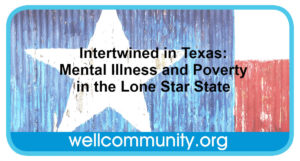 It’s hard to overstate the weight of poverty in the lives of those dealing with mental illnesses. Poverty can both increase the likelihood that a person will suffer from mental health challenges and make it more difficult for those already living with these struggles to pursue recovery.
It’s hard to overstate the weight of poverty in the lives of those dealing with mental illnesses. Poverty can both increase the likelihood that a person will suffer from mental health challenges and make it more difficult for those already living with these struggles to pursue recovery.
Many intertwining factors related to poverty create a tangled cycle for those living with mental health conditions. For example, a serious mental illness can make it difficult for a person to hold down a job. As a result of being out of work, they may be unable to afford healthy food or a bus pass to get to a doctor’s appointment, adding extra hurdles in managing their illness. They may lose their housing, further eroding their ability to pursue stability. And, as they lack the resources necessary to take steps to improve their mental health, they remain unable to work and their condition may become an even greater struggle.
While issues like these are a challenge for many nationwide, a number are especially pressing in Texas. These factors include housing insecurity, food insecurity and lack of access to mental health care.
Housing Insecurity
Housing insecurity can magnify mental health challenges in numerous ways, and it’s a particularly daunting issue in Texas. According to the National Low-Income Housing Coalition, Texas has a shortage of nearly 600,000 affordable and available housing units for extremely low-income individuals. The Dallas area alone is short by over 165,000; currently, it has just 20 units for every hundred households in need of them, just over half the national average of 37 units per hundred households.
The lack of affordable housing in the area contributes to the growing homeless population. According to the U.S. Department of Housing and Urban Development, over 25,000 Texans experience homelessness on a given day. Over 4,500 of them can be found in Dallas and Collin Counties, as reported in the Metro Dallas Homeless Alliance’s 2019 State of Homeless Report.
Food Insecurity
Food insecurity—lack of consistent access to enough food for an active, healthy life—has been shown to have a negative impact on mental health in numerous ways, from difficulty concentrating to an increased risk for depression and suicidal ideation.
According to Feeding Texas, one in seven Texans is food insecure, higher than the national average of one in eight. The issue is even more prevalent in Dallas than in the state overall, touching over 17 percent of households.
Access to Care
Mental health disparity and care provider shortages have an especially devastating effect on those impacted by poverty. While someone making a middle-class income may be able to cross Dallas to receive care from a provider that takes their insurance or pay a higher fee to see a nearby doctor that’s out of network, those below the poverty line don’t have these options.
Mental Health America ranks Texas as 50th among all states for access to mental health care. One big factor in this bottom-of-the-barrel rating is the many people lacking health insurance: 23 percent of Texans living with mental illnesses are uninsured—a greater portion of the population than in any other state. Over 62 percent of those in the state dealing with a mental health challenge aren’t receiving treatment.
At the Well Community, those in the Dallas area who are faced with the intertwined challenges of mental illness and poverty find support and assistance. At our Community Life Center and Thursday Night Life, they’re able to enjoy nutritious meals in the company of others who accept and care about them. Through case management they receive assistance in accessing services and resources; and at Jacob’s House, The Well’s licensed boarding house, a group of men has a safe, stable place to live. And, perhaps most important, members are able to be part of a community where all are welcomed and all are encouraged to pursue mental health stability.
Please consider how you can support The Well Community in its mission to provide hope and healing to adults recovering from mental illness through healthy relationships, essential services and meaningful work. Give now.
Be sure to follow The Well Community on Facebook, Twitter and Instagram to learn more about mental illnesses and poverty, as well as how The Well provides a place of community and support.
